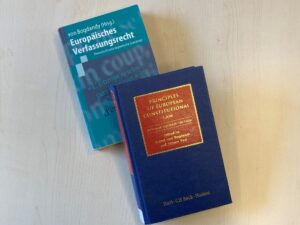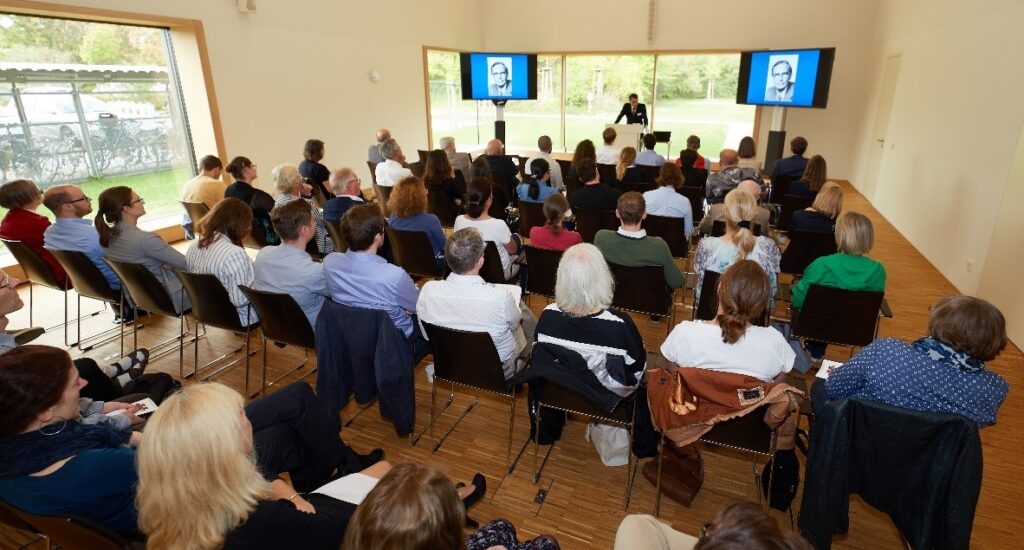For the general international lawyer, neither specialized in EU law nor in European human rights law (never mind German public law), the assignment to discuss what the Max Planck Institute for Comparative Public Law and International Law (MPIL) has done for EU law, European human rights law and German public law assumes impossible dimensions: one might (almost) as well have asked me what the influence of NASA on the development of the US military has been. Plus, it is tempting to refer to the wise, if possibly apocryphal, words of Zhou En Lai when asked about the effects of the French revolution: it might be too early to tell… And yet, on closer scrutiny (and a different level of abstraction), it becomes plausible to sketch some contours, whether deriving from training, practical involvement, or theorizing.
It is generally acknowledged that the center of gravity of the MPIL has always rested with general international law; indeed, the appointment, in 2002, of Armin von Bogdandy as one of the directors, with a background more pronounced in both EU law and international trade law, may have raised a few eyebrows at the time. That is not to say no forays had been made into EU law and especially European human rights law: previous directors Rudolf Bernhardt and Jochen Frowein can justifiably claim to have been among the pioneers in that field. But even so, the MPIL was always more about international law than about EU law or even human rights law, all the more so once those disciplines started the slow separation process from international law. If in the 1960s it still made sense to view EU law as part of international law, by the late 1980s this had become considerably less plausible, and much the same applies, with a little time lag perhaps, to European human rights law. Others on this blog have indicated that, e.g., the ‘black series’ (Schwarze Reihe) of MPIL monographs and collective volumes, hugely impressive as it is, contains relatively little on both EU law and European human rights law, and much the same applies to the annals of the Heidelberg Journal of International Law (Zeitschrift für ausländisches öffentliches Recht und Völkerrecht).
Some Reproduction, Some Socialization
As far as training goes, large numbers of German public lawyers, EU lawyers and international lawyers must have passed through the MPIL at one stage of their career or another, either for a shorter stay or for a period of several years as research fellow. Having sometimes addressed some of them en groupe, it is reasonable to conclude that the best of them (in terms of professional skills) are very, very good indeed. There was a time – and perhaps there still is – when the external relations section of the EU’s legal service was staffed with many MPIL alumni; and personal experience suggests that rarely a group of lawyers can have had such a critical mass within an institution. By the same token, many German Foreign Office lawyers must have passed through MPIL, and many of the current generation of established German international law professors have spent considerable periods of time as well: think only of Jochen von Bernstorff, Isabel Feichtner, Matthias Goldmann, Nele Matz‑Lück, or Andreas Zimmermann – and I am probably omitting many more from the list than I should in polite company.
It is too easy to suggest that having passed through MPIL, these individuals transmit MPIL values and methods and ways of thinking on to the next generation (in the case of the professors) or to their colleagues (in the case of the civil servants – the distinction is blurry to begin with). On the other hand, it would also be far too easy to suggest that no transmission of values, methods and ways of thinking takes place; a strong case can made for legal education (and this includes doctoral and post‑doctoral training) as a process of socialization, where pupils first sit at their master’s feet and then become masters having their pupils themselves. Reproduction will rarely be total, but some reproduction, some socialization, will be present, all the more so when the training is high‑level.
And this is not limited to Germans working in Germany alone. MPIL alumni spend time in international organizations; those who come from abroad may end up working for their home governments, and some successful German international law academics based outside Germany have a strong background in the MPIL: think of Jutta Brunnée in Toronto, Nico Krisch in Geneva, or Ingo Venzke and Stephan Schill in Amsterdam – and again I am likely missing more than a few. In other words, in much the same way as the Chicago School of Economics has been (or still is) a training ground for economists worldwide, and Harvard Law School can credibly be seen as a global finishing school for legal practice (something the same school tries to emulate for a certain class of academics through its Institute for Global Law and Policy), so too has the MPIL delivered generations of international lawyers; therewith, it exercises considerable epistemic authority.

Rudolf Bernhardt as a Judge at the ECHR[1]
Such epistemic authority has also been exercised (and is still exercised) through involvement in practice. At least three of the German judges on the International Court of Justice over the last 60 years or so have spent a considerable period of time at the MPIL: Hermann Mosler (even as a director), Carl‑August Fleischhauer, and the current German judge, Georg Nolte. Hans‑Peter Kaul, another MPIL alumnus, was one of the judges at the International Criminal Court (which he helped create as well). Rüdiger Wolfrum, for two decades or so director of the MPIL, has spent many years at the International Tribunal for the Law of the Sea and helped arbitrate a handful of disputes before the Permanent Court of Arbitration, while two other erstwhile directors (Bernhardt and Frowein) were members of the (now defunct) European Commission on Human Rights. More recently, Angelika Nussberger has been a judge at the European Court of Human Rights, while current director Anne Peters has been a member of the Council of Europe’s Venice Commission, tasked with promoting and evaluating the rule of law in the Council’s member states. Tongue‑in‑cheek it may be added that the other current director, Armin von Bogdandy, has served as the President of the OECD’s Nuclear Energy Tribunal, although this Tribunal, like some others in the international sphere, has yet to receive any cases.
Thinking and Re-Thinking International Law – and Europe’s Public Order
But perhaps the most obvious form epistemic authority can take, with academic institutions, is the thinking and re‑thinking of what goes on in the world. German legal scholarship is traditionally very good at this, but within the German tradition, the MPIL still stands out. Anne Peters has done much (in particular before her tenure at the MPIL commenced) to re‑think the global order as a constitutional legal order, more or less continuing the tradition going back at least to Hermann Mosler. Mosler famously imagined international society as a legal society, rather than, as was common when he wrote, as a fairly random collection of billiard balls, bound together by not much more than self‑interest and balances of power or, at best, by a shared sense of anarchy. And it is hardly an exaggeration to claim that Peters during her tenure has done much to re‑position the individual in the international legal order and has almost single‑handedly created a novel sub‑discipline within international law, in the form of animal law.
For his part, Armin von Bogdandy is responsible not only for guiding a re‑conceptualization of the field of international organizations law concentrating on the exercise of public authority on the international level, but also, more appropriate to the current assignment, for systematizing ideas about Europe’s public order and for identifying principles of European constitutional law.
 Perhaps the main work to be referred to here is the monumental Principles of European Constitutional Law (co-edited with Jürgen Bast), conceived when the Treaty establishing a Constitution for Europe was on the agenda but outliving that particular event: the principles identified – and more broadly the field of European constitutional law – do not require a particular constitutional document to retain their validity. One point to note though is that, being principles of constitutional law, they pertain more to the relationship between the EU and both its citizens and its member states, than to other matters. These constitutional principles include equal liberty, the rule of law, democracy, and solidarity, as well as principles of Union unity, respect for diversity among the member states, and the wonderful (and wonderfully intriguing) principle of Gemeinschaftstreue. The list is persusasive, and derives from a number of sources, including the case‑law of the Court of Justice of the European Union (CJEU).
Perhaps the main work to be referred to here is the monumental Principles of European Constitutional Law (co-edited with Jürgen Bast), conceived when the Treaty establishing a Constitution for Europe was on the agenda but outliving that particular event: the principles identified – and more broadly the field of European constitutional law – do not require a particular constitutional document to retain their validity. One point to note though is that, being principles of constitutional law, they pertain more to the relationship between the EU and both its citizens and its member states, than to other matters. These constitutional principles include equal liberty, the rule of law, democracy, and solidarity, as well as principles of Union unity, respect for diversity among the member states, and the wonderful (and wonderfully intriguing) principle of Gemeinschaftstreue. The list is persusasive, and derives from a number of sources, including the case‑law of the Court of Justice of the European Union (CJEU).
Arguably though, not unlike a Rubik’s cube, a constitutional order has other sides as well. This has become considerably clearer after the book first saw the light, with the CJEU making much of a principle of autonomy in a case such as Achmea. And as autonomy is always a relational notion, the autonomy here is not so much autonomy vis‑à‑vis the member states, but rather the autonomy of EU law (its legal order) vis‑à‑vis competing legal orders.
Be that as it may, and despite the circumstance that such exercises always have a relatively high von‑Münchausen‑quality (a system pulling itself up by its own hair, so to speak), thinking of the EU in terms of constitutional principles was rather novel at the time, and has stood the test of time, at least thus far: the principles identified seem to have become generally accepted as such in the intervening two decades – and that marks quite an achievement.
Great Epistemic Power, Great Epistemic Responsibility

Armin von Bogdandy at the Max-Planck-Tag 2018[2]
So, it seems clear that MPIL exercises considerable epistemic authority: through training, through legal practice, through its research work. There is (ironically perhaps) always a price to pay: epistemic authority is rarely legitimated by considerations of democracy or the Rule of Law; instead, it takes place when democracy proves inert, or paralyzed, or disinterested. And of course some things cannot be democratically decided on to begin with: one cannot meaningfully legislate a ‘principle of solidarity’, e.g., or perhaps even ‘legislate’ principles to begin with. It may be possible to enact rules embodying solidarity, but principles are generally too evasive to be legislated. And this, in turn, suggests that much comes to depend on the individuals exercising epistemic authority: with great epistemic power comes great epistemic responsibility, to paraphrase an old maxim.
Even so, things could hardly be otherwise. An institution such as the MPIL is bound to exercise epistemic authority, whether it wants to or not. Bringing excellent scholars together, training them, sending them out in the world, participating in governance, and re‑thinking the law and legal orders: how could this, if done properly (or even improperly) not be authoritative? It may well be that the contribution of MPIL to international law has been more obvious than its contribution to EU law or European human rights law, but gazing at Europe nonetheless reveals something to reflect upon.
[2] Photo: MPIL.
|
Suggested Citation: Jan Klabbers, Gazing at Europe. The Epistemic Authority of the MPI, MPIL100.de, DOI: 10.17176/20240318-143111-0 |
|
| Lizenz: CC BY-NC-SA 4.0 DEED | |

Jan Klabbers teaches international law at the University of Helsinki. His research focuses on the law of international organizations.


